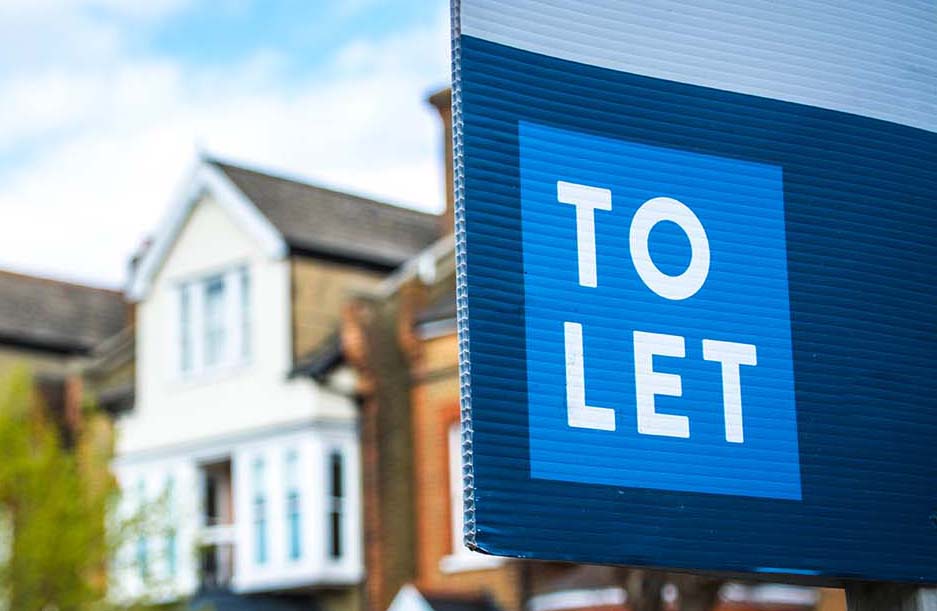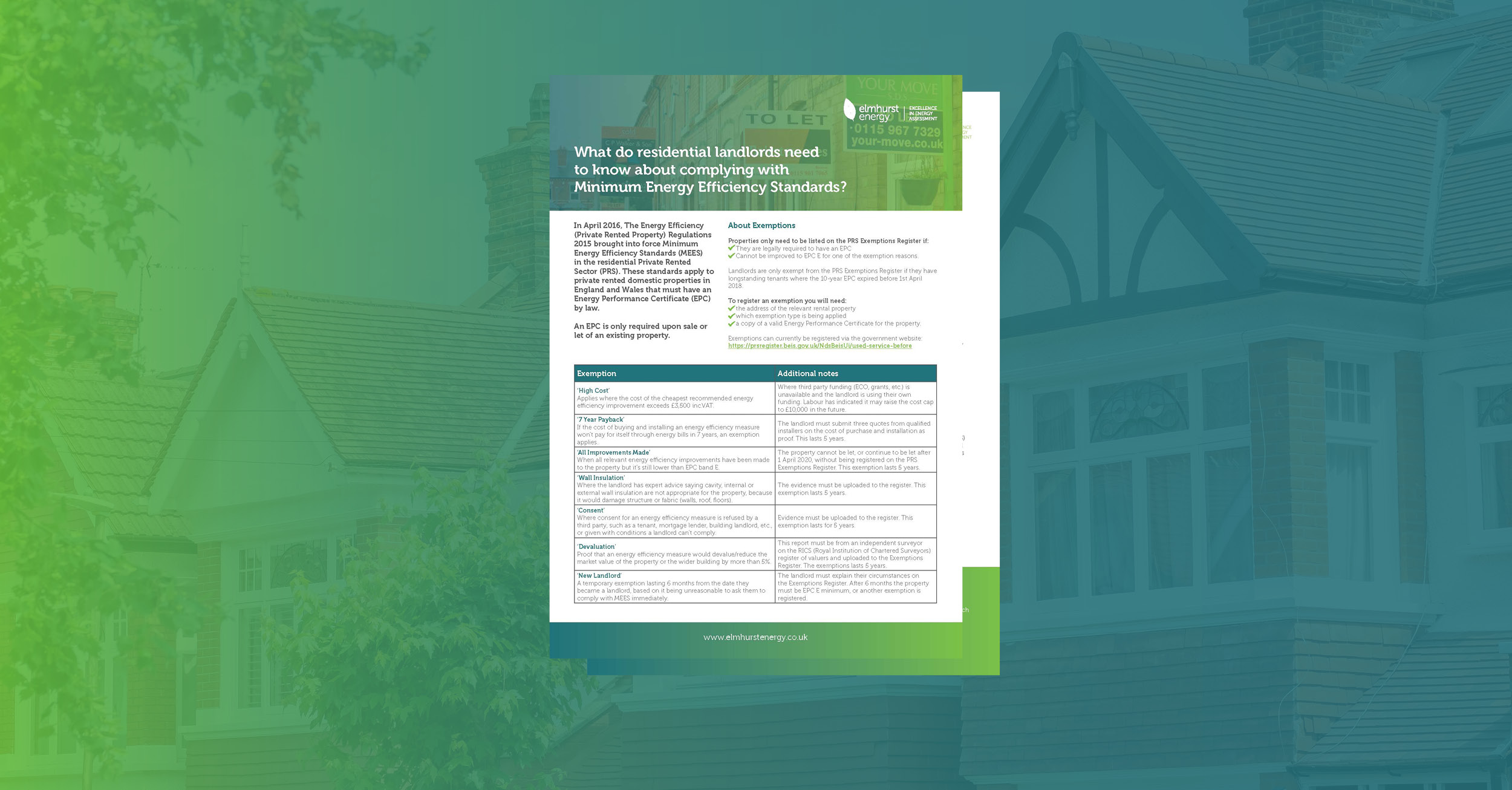Navigating Minimum Energy Efficiency Standards (MEES): What Landlords Need to Know
The Minimum Energy Efficiency Standards (MEES) require private rented properties in England and Wales to have an Energy Performance Certificate (EPC) rating of at least E. It is important for energy assessors and landlords to be familiar with the regulations in place and to understand the options available if a property does not achieve the minimum EPC rating.

What are Minimum Energy Efficiency Standards (MEES)?
The Minimum Energy Efficiency Standards (MEES) are a set of regulations that establish a minimum energy efficiency rating, or Energy Performance Certificate (EPC) rating, for domestic private rented properties in England and Wales.
Since 1 April 2018, landlords have been prohibited from letting domestic properties under new tenancies if the EPC rating is below an E, unless a valid exemption applies. From April 2020, the standards extended to cover existing tenancies, unless it’s a longstanding tenancy where the 10 year EPC expired before 1 April 2018.
The aim of the minimum standards is to improve the energy efficiency and quality of private rented homes, aligning with the UK’s commitment to reduce carbon emissions and reach net zero.
Why are Minimum Energy Efficiency Standards important?
The UK has some of the worst-performing buildings in Europe. To achieve net zero carbon emissions by 2050, it is estimated that approximately 29 million homes need significant energy efficiency improvements.
Data on fuel poverty indicates that 35% of fuel poor households in England are in the Private Rented Sector (PRS), equating to over 1.1 million homes. Poorly performing homes can lead to high fuel bills, as well as cold, draughty living conditions that pose a health risk to occupants.
The MEES regulations establish a baseline for energy performance in private rented properties to improve energy efficiency, reduce carbon emissions, and combat fuel poverty.
What do Landlords Need to Know About Complying with MEES?
It is important for landlords to have a good understanding of MEES, including the minimum EPC rating their property must meet and the government proposals for higher minimum standards in the future.
If a landlord does not have a valid EPC, it is crucial to obtain one immediately. This will provide the current EPC rating of the property, which may have changed over time, and list recommendations for improvement.
If a landlord wishes to regain possession of a property using a Section 21 notice, they must also ensure that a valid EPC is in place, as it is a legal requirement for the eviction process. More information on this is available on the government webpage: Evicting tenants in England.
To find an existing EPC, landlords can search the property’s postcode on the following websites:
- For properties in England, Wales or Northern Ireland: https://www.gov.uk/find-energy-certificate
- For properties in Scotland: https://www.scottishepcregister.org.uk/
If a landlord is found in breach of MEES regulations, they could face penalties of up to £5,000.
What if a Property Does Not Meet the Minimum Standard?
If a property does not achieve an EPC rating of E or higher, it does not necessarily mean that it cannot be rented. There are a number of options available to Landlords in this situation:
Explore Improvement Options:
To find a DEA in your area, search your property’s postcode on the ‘Find An Assessor’ directory.
Review Available Funding:
There are a number of government funding schemes and grants available to support energy efficiency improvements. These include:
Boiler Upgrade Scheme (BUS): The Boiler Upgrade Scheme is a government grant for people in England and Wales, running until 2025. Through the scheme, you could receive up to a £7,500 grant to cover part of the cost of replacing fossil fuel heating systems with a heat pump or biomass boiler.
Energy Company Obligation (ECO): The ECO Scheme provides funding to low-income, fuel-poor and vulnerable households to heat their homes. The latest iteration, ECO4, targets the least energy efficient homes in the UK, specifically those that have an EPC of D or lower. Through the scheme, these homes could receive heavily discounted or free home insulation, green heating systems or an upgraded boiler.
For more information on government funding schemes, visit the ‘Funding for Homeowners’ webpage.
Consider Exemption Options:
Landlords may register for an exemption to remain compliant with MEES regulations, even if their property does not meet the required standards.
There are a number of exemptions available under MEES, which landlords can apply for if they meet the eligibility criteria. These exemptions include:
- High cost exemption
- All improvements made exemption
- Wall insulation exemption
- Consent exemption
- Devaluation exemption
- New Landlord exemption
To apply for an exemption, landlords will need to provide the details of the property, such as the address and EPC, and upload any evidence to support their exemption claim, such as quotes for improvement work.
All exemptions must be registered on the PRS exemptions register. Unlike an EPC, an exemption is linked to the Landlord, not the property. This means that if a new landlord comes into the property, they will need to re-register for the exemption if it still applies.
MEES Information Factsheet
For more information on MEES exemptions and their eligibility criteria, download our MEES Information Factsheet.
DOWNLOAD FACTSHEET >
Elmhurst Thoughts:
The rental sector represents a significant portion of the EPC market. It is crucial for both energy assessors and landlords to fully understand the MEES regulations to ensure compliance and safeguard the interests of their clients and tenants.
It is important to understand that if a property does not achieve an EPC rating of E or higher, it does not necessarily mean that it cannot be rented. Landlords have several options available in this situation, such as seeking expert advice, exploring funding opportunities, or applying for an exemption. It is important to carefully evaluate all options available before making a decision.
We will continue to keep members and landlords updated on the MEES regulations and any upcoming changes, as well as ensure they receive the appropriate guidance and resources for further support.
If you are a landlord and require further guidance on MEES or have additional questions, please contact a Domestic Energy Assessor (DEA) in your area.
Find An Assessor
To find a Domestic Energy Assessor near you and to obtain an up-to-date Energy Performance Certificate (EPC), search your property’s postcode on the UK’s largest database of energy assessors and retrofit professionals.
SEARCH NOW >
Further Resources:
Elmhurst website: MEES Regulations – Minimum Energy Efficiency Standards for Landlords – https://www.elmhurstenergy.co.uk/minimum-energy-efficiency-standards-mees-for-landlords/
Gov.uk: Domestic private rented property: minimum energy efficiency standard, landlord guidance – https://www.gov.uk/guidance/domestic-private-rented-property-minimum-energy-efficiency-standard-landlord-guidance
PRS Exemptions register – https://prsregister.beis.gov.uk/NdsBeisUi/used-service-before
